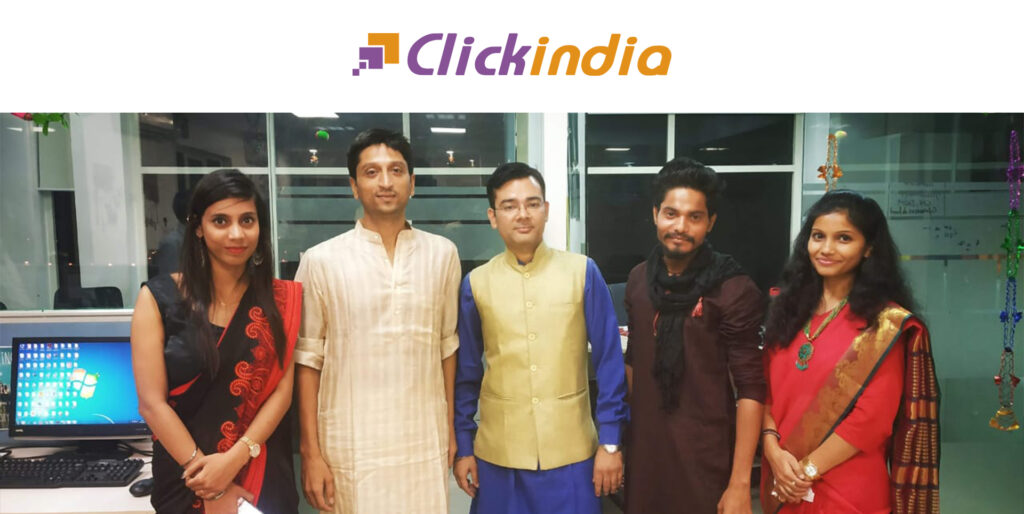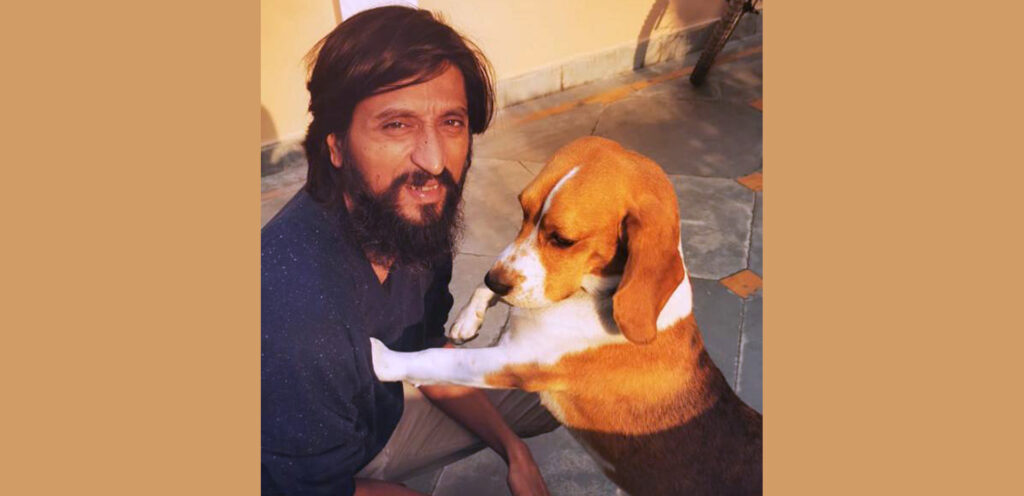We start off on a note that Pankaj Agarwal, Founder, ClickIndia has mastered throughout his entrepreneurial journey with his popular portal for classifieds. I ask him, why does he want India to click? To which he replies, “I think India has a lot of potential and resources to tap, be it natural or otherwise. People should have access to tools that can utilise these availabilities and create wealth for themselves and through that, help the country develop and grow.” On being asked to identify the kind of person who Pankaj Agarwal is, he says, “Pankaj is a person that takes pride when his nation does well. He is passionate about building things that help not just an individual but the society and through that country.”
The Origin And Importance Of Quality Education
Coming from the modest rural backgrounds of Nanpara in the Bahraich district bordering Nepal, Pankaj did not have access to quality of education and standard of life he aspired, he knew he had to do something more. On his side was the background of a Baniya family that he was blessed with. The business was in the family and he grew up seeing his generations conducting it. Post his school, he arrived in Delhi for graduation and post-college hours would go to IndiaMart office, a website started by his brothers and learnt as much as he could there.
There on he figured that, while the internet is being utilised well to help the business to showcase their work, the smaller platforms could not find a space. This is where the idea of Click India originated.” However, Pankaj did not start with entrepreneurship directly. He also went through the corporate path like many other entrepreneurs.
After graduating from Delhi University, he joins IIM Indore and from there on, he joins Citigroup. Reputed institutes could always give an edge in the development of entrepreneurial vision. In the end, we do get inspired by great minds and more so in their vicinity. Pankaj remembers his time in Indore, “You are stepping into a place with 100 people and you get the idea that 99 other than you, are smarter than you. You feel like, ‘okay I want to start fresh.’ There are so many driven, inspiring people around you, it just makes you do better. To challenge yourself, update, upgrade and to be corrected if you are wrong, for all, you get the right environment.”
Stigma And Entrepreneuship
Pankaj’s drive to strive in a competitive world also led him towards the path of entrepreneurship and his eventual exit from his corporate job. However, unlike other entrepreneurs, Pankaj sees the best of both worlds. “Corporate is exciting, no doubt about it. For me, the reason for exit majorly was the impact. If I can have a bigger impact utilising my potential to maximum, I would do that. Corporates teach you a lot of things that can be useful in your start-up as well. Like how things work. How large structures like a company are set-up, potential challenges, and it gives you a chance to meet colleagues who could be your next client or cofounder.”
In India, entrepreneurship is still at some level stigmatised particularly when you are bootstrapping it. Often people do not believe in innovation that they later recognise. This is due to different perceptions of dignity in work. “A fellow at IIM started a mobile recharge business and did so well that he funded his semester. I realised that no work is small. Every business has potential if it’s in the right place at the right time. It is about finding market opportunities and making use of it. The dignity of work issue is prevalent in strata where people were doing blue-collar jobs or entry-level white-collar jobs. That has changed a lot in the last twenty odd years. India has moved on to a different idea in terms of growth. I think we will still take more time to change. We now have people going back to their villages and hometowns to modernise the agrarian value chain so I think, a few more years and India’s workforce will be very different from what it is now. No work is small, we’ll psychologically accept that too.”

‘‘
While the internet is being utilised well to help the big business to showcase their work, the smaller platforms could not find a space. This is where the idea of Click India originated.
Networking is often considered the linchpin of entrepreneurial know-how. Professional friendships often become imperative as an entrepreneur goes ahead in his journey. For Pankaj, friendships are way above any business interest and it cannot be mingled. “I don’t make friends for business. It takes a very special place in your heart. So, connecting with somebody, just attending an event for business purposes, I don’t do it that way. We don’t think about business when there is friendship.”
In entrepreneurship, easy scaling and early exit are no surprise. Not many CEOs, founders make it to the top with a consistent attitude. Consistency requires discipline. Discipline requires ethics. Pankaj is clear when it comes to what an entrepreneur should do when it comes to ethics, “Shortcuts at the end are shortcuts. They do not pay you in the longer run. And, taking that shortcut might give you a hike in a shorter run but deep inside, you remember what you are doing, consciously or subconsciously.” Pankaj cites the tale of Mahabharata, where Karn had to make a choice between the two sides in the battlefield and he chose what he felt was ethically right. You might judge it in any way but he was ethically correct.” he adds.
One thing that every entrepreneur should know is that the ability to take risk is what will define them in the race. Pankaj has a backstory that amusingly fits the narrative of risks in entrepreneurship. “I got married in December 2006, I started my start-up leaving everything else in 2007 January. So, risk taking has been my life. Risk will only help you to achieve your potential to its fullest. If you just do not take any risk, it is like not walking on the road or driving a car fearing an accident. . So, for things to happen in entrepreneurship, risk has to be life.”

Books, Life and Talk Around Competition
Pankaj is a keen reader. He likes to read about culture and history not just to merely gain knowledge but to practically apply it as well. “My actions, belief system and learnings come from the knowledge that I’ve gained from reading such valuable texts. My wife tells me, that since I read a lot, I should look at not who did what but what we can do now, in order to come to the favourable situations, we could have reached. For example, Britishers came and they plundered our economy. This and that happened and we are not as big contributors to GDP as we were. However, what is the point over brooding what happened? Rather, let’s identify what we can do now to come back to our original place. Similarly, I try to do what I can,” he shares.
Personal life can be an instrumental factor in anybody’s success. In entrepreneurship, support of near and dear ones becomes even more decisive as the field is vulnerable to all kinds of possibilities. More failures than successes, to remember the harsh truth. Pankaj fondly remembers how he met the love of his life while competing against her in a corporate environment, “My partner and I were in the same company, different departments. We were competing against each other basically yet discussing work and learnings at the end of the day. Later, I realised I could find a friend who was pushing me to do better. Ever Since, she has been my pillar of support. She continues to encourage me to do better and strive for better. Life after marriage has been that of two friends, two friends who were competing against each other once to those who are now supporting each other.”
Every idea will bring inspiration to new people. Or there would always be some kind of competition in every sector. In entrepreneurship, you have to be thin-skinned to face the stiff competition while riding on cut-to-cut margins. While some entrepreneurs think of ruling the game by all means, others are able to understand the ecosystem much differently. Pankaj, whose speech oozes prescient wisdom thinks competition is a must, “All of us when we build solutions for the market, in the end, develop the market. The number of small and medium enterprises contribute a significant portion to the GDP. I think nearly one-third of it. So, this is a huge market. I don’t think just one player should cover such a huge base. The problem in itself is so big that we need to have multiple players providing multiple solutions.”
‘‘
I got married in December 2006, I started my start-up leaving everything else in 2007 January. So, risk taking has been my life. Risk will only help you to achieve your potential to its fullest.
Clarity of speech and thought are stipulated conditions to communicate as an entrepreneur. This comes with an innate habit of honesty. Pankaj, reiterates this fact, “Honesty to me is priceless. Whatever cost you pay for being an honest person, is a small price. The fundamental of relationships be it with family or a business relationship. With employees, investors and associates, the bottom line is it all comes down to trust you build. It is not about being right. Right is subjective. Honesty will develop trust and that is most important.”
On being asked to share the turning point of his life, Pankaj shares with Dutch Uncles how a mix of personal and professional events can be together pivotal in one’s life. “First would be striving for quality education. It was very crucial. Then meeting my wife. She has been my pillar of strength, my mentor too. And finally, starting the company, that decision was definitely a turning point of life too.” At the risk of breaking his professional thought of line while answering, Pankaj meekly adds, “My dog, my pet, is a super sweet teacher. Whatever you do to him, he will always come back to you irrespective. It is a learning experience if we see. My dog teaches the idea of innocence plus compassion.”
Trap Of Diversification
In any start-up, post the initial funding phase, diversification is one thing that excites an entrepreneur the most. Although, it acts like a lucrative trap if not carried out gradually. Pankaj shares his bit on the same, “We made that mistake. We started with a horizontal approach by targeting many industries. However, that was unnecessary at the start. A product should first grow by itself before diversifying. Though, agreeably, the ability to reject and not do something is very tough to have. First figure out the fundamental solution that your business provides and then don’t compromise on that. Get the best of technology for that solution, a Chief Technology Officer or whatever it takes.”
There are some vital qualities that when they are missing in a person, can lead to failure as an entrepreneur. Pankaj explains in his words, what kind of an entrepreneur can fail, “I think there is a fine line between being persistent and being a fool. When you are doing a business, which is bringing something new to the market, maybe a solution, then you should persist. Don’t pull out that early, for a start-up at least look at the first two years. Then take a call. If it still doesn’t work out, then it is time to stop. Entrepreneurs who give up early, generally make their whole execution plan based on expected positive outcomes. That is not always going to happen.”
Don’t Gush Funding A Lot
What has changed in entrepreneurship over the years? Pankaj replies with his insight from the last decade, “The glorification and fascination for companies that raise funds. I see this happening a lot. Without even thinking about their model, their product and other factors. I see for this reason a lot of founders just thinking about the next round of funding. A founder should not be always completely involved and be responsible for raising funds. It is good to celebrate the fact that you have raised money. At the same time also look at the sustainability that the market and your business entails.” There is a good side to the trends observed in entrepreneurship as well, “I see a lot of acceptance about start-ups too. It was tough back then. It wasn’t really taken well. Today I see, fathers proudly saying my son runs a start-up. It is being celebrated.”
Finally, as I ask, Pankaj, if he has any regrets, anxiety that keeps him awake, he shares. “Well, my wife complains that I sleep as soon as I rest myself in bed. I sleep that well (giggles). There are hectic days, this and that but usually when my work ends, there is a sense of calmness. The moment my work gets over be it in the evening or late at night, I sleep peacefully.”
For more such interesting stories do visit our Inspire section.





Hello 🙂 Your blog looks good. have a nice day. the blog was absolutely fantastic!
Hi, can you share the details in mail [email protected]